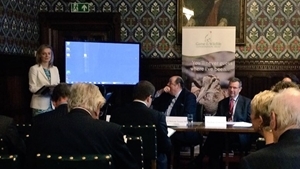 Liz Truss MP, Secretary of State for the Environment, Food and Rural Affairs, paid tribute to the scientific research of the Game & Wildlife Conservation Trust and its contribution to developing practical solutions to reversing the decline of our native wildlife. The Minister highlighted the importance of game conservation, including best practice predator control, as one of the many tools which can aid species recovery.
Liz Truss MP, Secretary of State for the Environment, Food and Rural Affairs, paid tribute to the scientific research of the Game & Wildlife Conservation Trust and its contribution to developing practical solutions to reversing the decline of our native wildlife. The Minister highlighted the importance of game conservation, including best practice predator control, as one of the many tools which can aid species recovery.
The All Party Parliamentary Group (APPG) gathered an audience at Westminster this week to discuss the future of the UK’s biodiversity and the tools needed to increase wildlife in our countryside. This included discussions on the use and benefits of legal predator control. Mike Short from the GWCT’s Predation Research team said:
“The GWCT has invested a huge amount of time and effort in improving the selectivity and welfare impacts of predator control practices. For example, when fox snares designed to allow non-target species to self-release are used in accordance with ‘best practice’ guidelines, they have been shown to pass internationally recognised trap welfare standards, although it’s critical that operators are properly trained in their use.”
The response of declining species to well-intentioned conservation measures is often disappointing. Through its research, the GWCT has identified effective and practical ways to reverse the decline of some species, including improved habitat measures, supplementary feeding during the winter months, and the legal control of common predators such as fox and carrion crow.
GWCT research has clearly shown that the provision of good habitat, in conjunction with legal predator control, can substantially boost species recovery. This is demonstrated by the Duke of Norfolk’s inspiring Peppering Partridge Project on the South Downs. Here, there has been a dramatic recovery of a whole suite of nationally declining farmland bird species, such as our native wild grey partridge, lapwing and skylark. Addressing the meeting the Duke emphasised that without effective predator control the project could not have worked.
The APPG meeting gave us the opportunity to impress on parliamentarians, and on land management and conservation organisations, that the continued availability of effective, lawful tools to manage predation pressure during the breeding season will be critical to securing the recovery of some dwindling native species.
Speakers on the board:
The Rt. Hon Liz Truss MP, Secretary of State for the Environment, Food and Rural Affairs;
The Rt. Hon. Sir Nicholas Soames MP, Chairman of the APPG on Game & Wildlife;
The Duke of Norfolk;
Mike Short from the GWCT’s Predation Research team.
Notes to editors
The Game & Wildlife Conservation Trust – providing research-led conservation for a thriving countryside. The GWCT is an independent wildlife conservation charity which has carried out scientific research into Britain’s game and wildlife since the 1930s. We advise farmers and landowners on improving wildlife habitats. We employ more than 60 post-doctoral scientists and other research staff with expertise in areas such as birds, insects, mammals, farming, fish and statistics. We undertake our own research as well as projects funded by contract and grant-aid from government and private bodies.
For information, contact:
Eleanor Williams
Telephone: 07592 025476
Email: press@gwct.org.uk